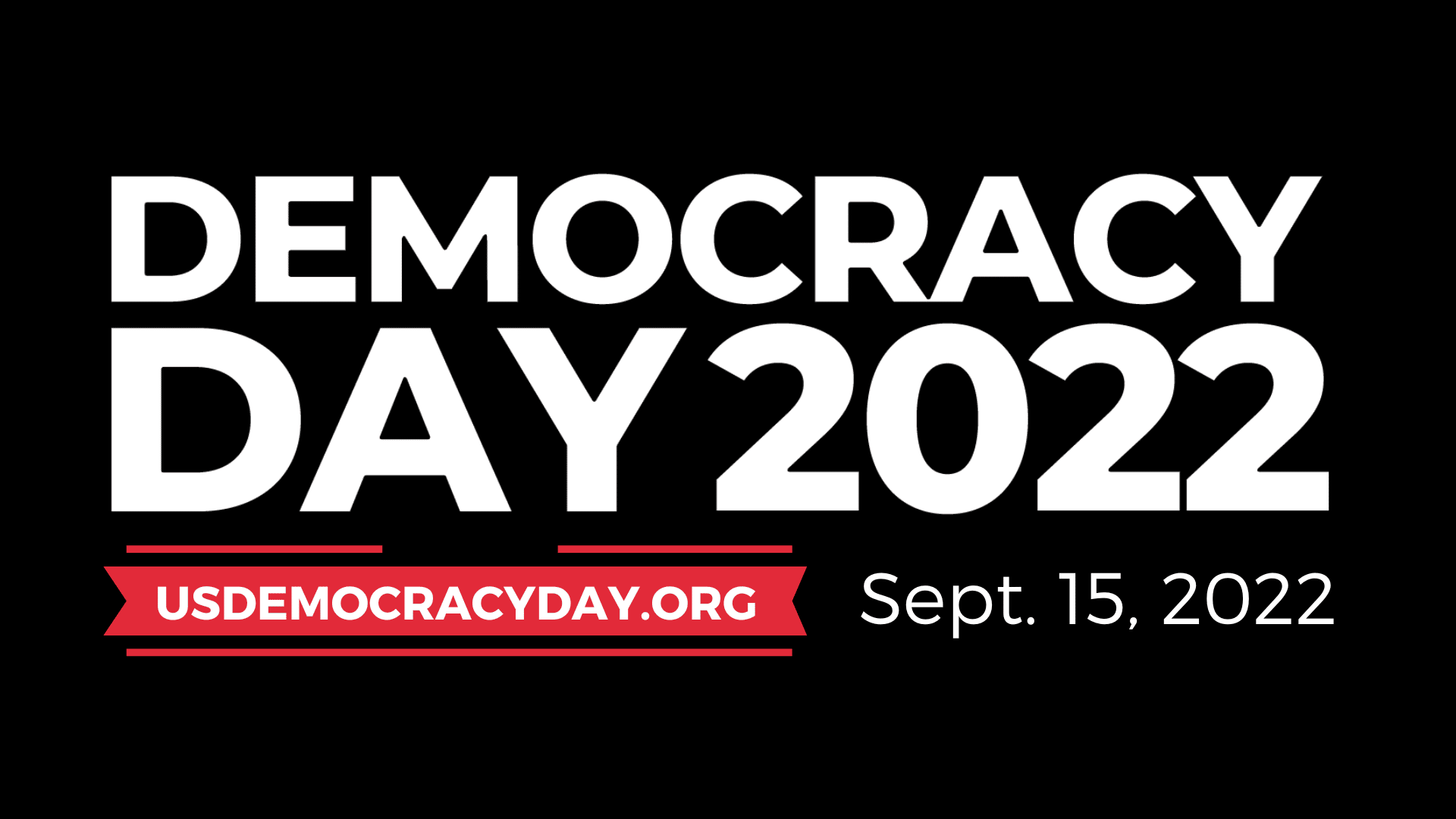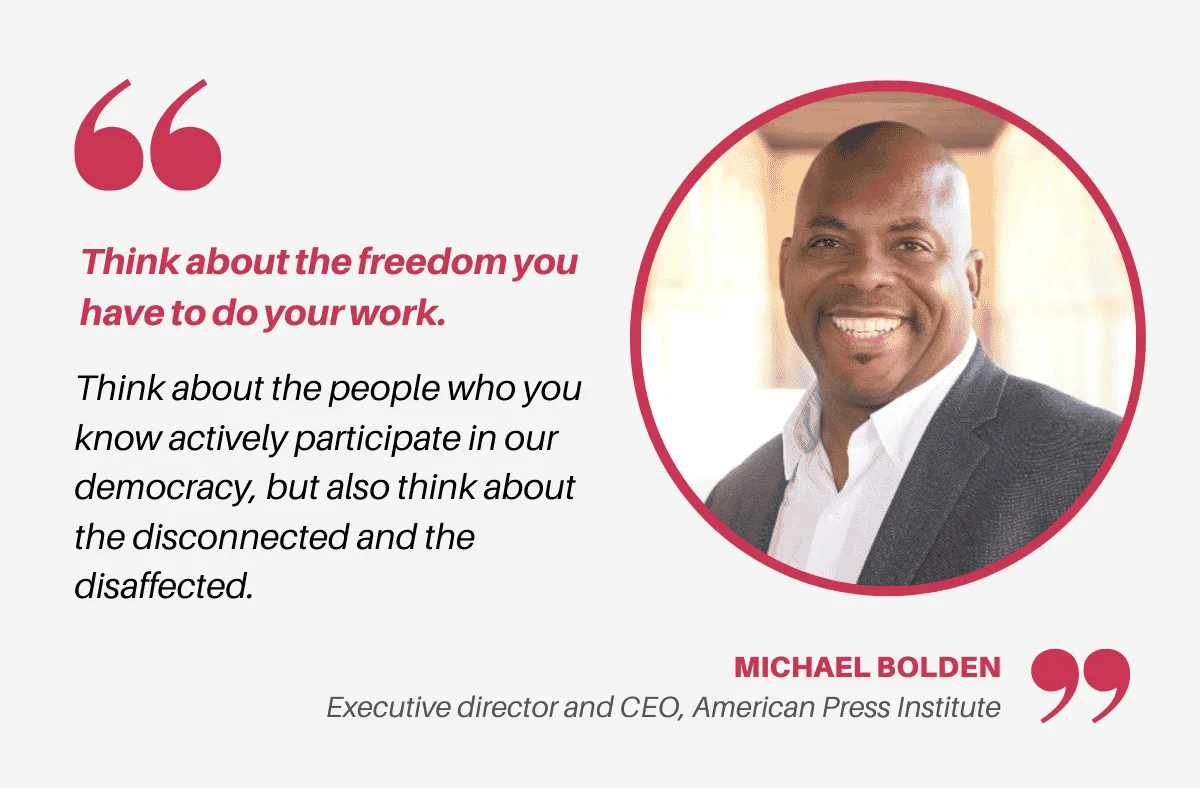The power of democracy and why journalists must work together to protect it
By Michael Bolden, CEO and Executive Director, American Press Institute
When my father was alive, he and I didn’t talk much about his service in the U.S. Army. It seemed so distant to me — and most of my adult memories are about him living as a retired grandfather and minister, not about something that had happened decades before I was even thought of. But he was buried six years ago with military honors. Standing at my Daddy’s grave, listening to a soldier playing “Taps,” I missed him, but I felt proud of him and reflected on what our democracy meant to this man.
Earlier this year, I found a digital copy of his World War II draft card. It confirmed that he had lied about his age to join the service, saying he was two years older than he was. Here was a man who grew up poor under Jim Crow laws, faced segregation and humiliation dealing with systemic racism every day, yet felt compelled to join the service to fight for this country’s supposed ideals. He lived in the deepest South, Mobile County, Alabama, where whites-only signs and racist violence were part of life. Yet, he believed in democracy.
George Washington called the creation of the American government “the last great experiment, for promoting human happiness, by reasonable compact, in civil society.” It was an experiment my Dad took seriously. He read and listened to reports about that experiment being threatened by autocrats around the world.
As I grew up, I saw that my father approached the idea of our representative democracy with reverence. He believed in voting. I don’t think he ever missed an election. But he also believed in being informed. He knew that the media, we journalists, were an important link with the information he needed to do what he believed was his duty as a citizen. As a child, I often went out to the front yard to get the newspaper for him. And Daddy would settle into his recliner to read the latest news from south Alabama and around the world. He paid attention to each page, often with broadcast news playing on the television across the room. He lived the reality of the imperfection of our country, but he lived in the hope that the ultimate outcome of the United States of America was worth the investment of his time and attention, and if need be, his life.
In creating the International Day of Democracy in 2007, the United Nations described democracy as “a universal value based on the freely-expressed will of people to determine their own political, economic, social and cultural systems, and their full participation in all aspects of life.”
My father believed in that participation, and he believed in the work that each of you do to help people like him participate in our society.
Yet, it is our democracy that gives all of us the freedom to do our work. Section 12 of The Virginia Declaration of Rights of 1776 said, “That the freedom of the Press is one of the greatest bulwarks of liberty, and can never be restrained but by despotic Governments.”
And we see despots and potential despots at work around the world trying to do that.
We see that happening now in Russia where any semblance of a free press has been shut down so that people don’t have access to information about what is really happening in Ukraine and even in their own country. We see it in the Philippines, where Rappler has been ordered to shut down, where the government doesn’t want people to be informed, to be able to participate fully in their society.
We have seen the growth of lies and misinformation to influence people’s participation for the benefit of personal political gain here in the United States.
The 2021 Press Freedom Index from Reporters Without Borders shows that journalism is blocked, impeded or constrained in almost 75 percent of the countries it examined. And while press freedom in the U.S. was labeled “fairly good,” we only ranked 44th, with what was cited as “a record number of assaults and arrests of members of the media” threatening our work.
Our work matters because freedom of the press is not guaranteed. Democracy is not guaranteed. It requires our work. The participation of each of us as residents of this country and as journalists requires work. Many of us, we look around and we say, of course, we must care about democracy. We don’t think there is a need to explain.
We forget that much of our journalism doesn’t reflect the perspectives, sensibilities, and realities of many people in our country. There are people and entire communities who have seen what is supposed to be a democracy, ignore them, or even actively work against them. They are beyond being critical. They are indifferent. They have written off the role of democracy in their lives. They have written off the role of much of the media in their lives. But we can’t write them off, and we can’t write off our responsibility to them and to try to maintain our great experiment.
At the American Press Institute, we believe that for democracies to thrive, people need accurate news and information about their communities, the problems of civil society and the debates over how to solve them. However, American confidence in elections, institutions and the media continues to weaken over time, according to Pew Research Center and Gallup. It even manifests in a lack of confidence the American people have in making decisions under our government system. People need us. Our society needs us.
With important elections on the horizon, we see an immediate need to help local news organizations forge stronger relationships with their communities through better reporting and deeper listening that will improve coverage for 2022 and beyond. We must shore up trust and engagement among communities everywhere, but especially with communities of color.
The American Press Institute’s core work helps news organizations shift culture and practices to improve journalism and sustainability. While substantive change can take a lot of time and energy, we have seen time and again how even small grants of a few thousand dollars can help news organizations get “unstuck” from a status quo in coverage or business approaches. In recent years we have begun distributing small grants to gather insights for our mission and to help publishers have a reason — and momentum — to take steps toward doing journalism differently. We plan to do that for the upcoming elections and to help empower your work, so expect an announcement from us soon about that opportunity.
None of us can be satisfied or complacent about sounding the alarm on one day, or of equipping the public with the information they need on one day. Think about the freedom you have to do your work. Think about the people who you know actively participate in our democracy, but also think about the disconnected and the disaffected.
Think about the hope you bring when you tell people how our systems work, or how they don’t work, and that they can have the power to help all of our lives change.
That is the power of our democracy, and that is why Democracy Day is important to us.
🏦 Questions about Democracy Day? Need more info? Get in touch!
Email us for more info about how to become a partner or financially support Democracy Day.
Still have questions? Contact the Center for Cooperative Media directly by sending an email to [email protected].
Michael Bolden is the CEO and Executive Director of the American Press Institute. Email Michael at [email protected] or follow him on Twitter @michaelbolden.
About the Center for Cooperative Media: The Center is a grant-funded program of the School of Communication and Media at Montclair State University. Its mission is to grow and strengthen local journalism, and in doing so serve New Jersey residents. The Center is supported with funding from Montclair State University, the Geraldine R. Dodge Foundation, Democracy Fund, the New Jersey Local News Lab (a partnership of the Geraldine R. Dodge Foundation, Democracy Fund, and Community Foundation of New Jersey), and the Abrams Foundation. For more information, visit CenterforCooperativeMedia.org.


